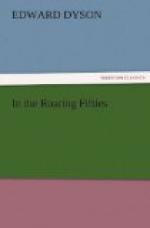‘We are none too soon.’
‘Not a moment.’
The five men had only their revolvers and a stock of cartridges; these they handed over to the emissary of the ‘republican forces,’ and continued their journey with eager feet, greatly elated. Ballarat was at this time the centre of the feverish interest the Victorian gold discoveries had excited throughout the world. Men were digging fortunes out of the prodigal earth with a turn of the hand. The Gravel Pits, Golden Point, Bakery Hill, Specimen Hill, Canadian Hill, White Hills, White Flat, and half a dozen other local rushes, were in the height of their amazing prosperity; economists were gravely considering the possibility of this tremendous output reducing gold to the status of a base metal, and Main Road seethed with life.
Done’s experiences on Forest Creek and at Jim Crow and Simpson’s Ranges had not prepared him for the stormy exuberance of Ballarat. This was the largest, most populous, and most prosperous of all the fields. In a little over two years’ time the population of a large town had overrun the Bush, swept the trees from the face of the earth, and had dug at and torn and tortured the wide fields till the landscape resembled a great cemetery where thousands of open graves yawned in advance of a mighty sacrifice. The work of devastation climbed up the hills, overthrowing them piece by piece, and through the debacle the sloven creeks, filled with yellow slurry, and thrown out of their natural courses a score of times by the ravishers, wound their painful way. Tents, glowing whitely under the bright sun, dotted the flats, and gathered into villages of canvas on the sides of the hills. Here and there a flag fluttered in the breeze, and men were everywhere—men remarkably alike in type, strong, bearded, sun burnt, their digger’s garb as monotonous as a uniform, but picturesque and easy. Evidently little work was going forward. The excitement of the revolt was at its height, a sense of the imminent climax was in the air, and the men were gathered in knots and meetings discussing the position.
As Jim and his friends came in by Specimen Hill, they saw bodies of troopers being moved as if in drill at the camp on their left. These operations were watched by hundreds of diggers. Further on they saw the massed red coats of swaddies, and heard the faint rattle of kettle-drums. The British flag floated over the camp. A mounted officer in crimson and gold passed them, riding at a gallop, and the sound of a gunshot struck upon their ears, a sharp note of war.
Main Road and Plank Road were well-defined streets of tents and stores. The great majority of the dwellings and places of business were of canvas still, but here and there a pretentious weatherboard hotel, iron-roofed, stood proudly eminent, luring the diggers with a flaring topical sign. Here again the way was crowded with blue-shirted men, smoking, talking, gesticulating, never a coat nor a petticoat amongst them. There were a good many women in Ballarat in ‘54, but nearly all miners’ wives, little was seen of them where the men assembled. Jim noted yet again juvenile levity of the diggers.




